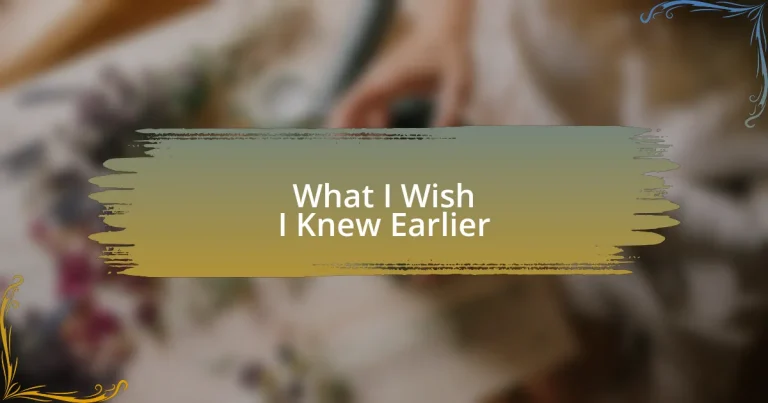Key takeaways:
- Good alcohol reviews balance technical details with sensory experiences, allowing readers to connect emotionally with the drinks.
- Personal anecdotes in reviews transform descriptions into rich narratives, enhancing relatability and fostering community among enthusiasts.
- Context and atmosphere significantly influence the perception and enjoyment of beverages, highlighting the importance of setting in tasting experiences.
- Approaching each review with an open mind can lead to unexpected discoveries that challenge preconceived notions about certain beverages.
Author: Clara Whitmore
Bio: Clara Whitmore is an acclaimed author and storyteller known for her captivating narratives and richly drawn characters. Her work spans several genres, including contemporary fiction and historical romance, often weaving elements of personal experience into her writing. Clara holds a Master’s degree in Creative Writing from the University of Edinburgh and has published three novels, which have garnered critical acclaim and a loyal readership. When she’s not writing, Clara enjoys exploring quaint bookstores and hosting literary workshops. She currently resides in Portland, Oregon, with her dog, Jasper.
Understanding Alcohol Reviews
Understanding alcohol reviews is more than just looking at scores; it’s about experiencing the stories behind each bottle. When I first started reading reviews, I remember being overwhelmed by technical jargon that didn’t resonate with my personal tastes. It made me wonder: how can I truly connect with an alcohol if I can’t even understand the language used to describe it?
As I’ve dived deeper into the world of reviews, I’ve learned to appreciate how passionate reviewers share their thoughts. One line that stuck with me from a review was about a whiskey having “notes of caramel dancing on the tongue.” It painted such a vivid picture! This taught me that good reviews balance technical details with sensory experiences, allowing readers to visualize—and even crave—the flavors.
I also often find myself reflecting on how reviews can shape our choices. Have you ever bought a bottle based on glowing feedback only to be disappointed? I have, and it made me realize that everyone’s palate is unique. Meaningful reviews should convey not just the technical aspects, but also how a drink can evoke memories or feelings, helping us connect more personally with what we choose to sip.
Importance of Alcohol Reviews
Alcohol reviews serve as a guiding light in the vast sea of choices available today. I remember my first encounter with a craft beer; a detailed review highlighted the “hoppy aroma” and “tropical fruit notes.” This was more than just a description; it helped me visualize the experience before I even took my first sip. It’s fascinating how such reviews can elevate our expectations and enhance our enjoyment of what we drink.
What I find particularly valuable about engaging alcohol reviews is their ability to reflect personal experiences and shared memories. When a reviewer recounts enjoying a particular wine during a celebration, it strikes a chord. It reminds me of a special birthday toast I shared with friends over a delightful Merlot. Those personal touches transform a simple description into a rich narrative that resonates and connects with potential buyers.
Additionally, reviews can even alter our perspectives on beverages we might usually overlook. I recall being skeptical about a particular gin until I read how a reviewer artfully described its “botanical complexity” and how it paired beautifully with tonic on a hot summer day. That insight shifted my mindset entirely and led me to discover a new favorite. Isn’t it amazing how someone else’s thoughts can open doors to new experiences?
Common Types of Alcohol Reviews
When diving into the world of alcohol reviews, you’ll often come across tasting notes, which describe the flavors and aromas of a beverage. I vividly recall reading a whiskey review that spoke about a “smooth vanilla finish” and a “subtle spiciness.” Just reading those words made my mouth water and piqued my curiosity to try that particular bottle. Isn’t it intriguing how descriptive language can transport us to those flavors even before we take a sip?
Another common type of review is the pairing suggestion, which offers insight into what foods go beautifully with certain drinks. One of my favorite memories is enjoying a rich stout that a reviewer recommended pairing with chocolate cake. Trusting this advice, I went for it, and the harmony of flavors was nothing short of magical. Have you ever stumbled upon a review that led to a culinary revelation?
User-generated reviews are also prevalent in the alcohol community. When I read fellow enthusiasts’ opinions on a new gin, their candid experiences grip me. I remember one user describing how the gin reminded them of summer picnics, filled with fresh herbs and citrus. Their enthusiasm made me eager to recreate that moment myself. This kind of relatable sharing often feels more genuine than a professional review; it fosters a sense of community in our shared exploration of flavors.
What Makes a Good Review
A good review goes beyond just outlining flavors; it captures the essence of the experience. I remember reading a review about a craft beer that compared its taste to “a sunny afternoon picnic.” Those evocative words didn’t just describe the beverage; they conjured a scene in my mind, making me yearn to partake in that very moment. Have you ever found yourself searching for a drink just because of the imagery in a review?
Clarity is another crucial factor. A review can be packed with flavors, but if it’s muddled, it loses its impact. For instance, I once encountered a wine review filled with complex jargon that left me more baffled than enlightened. In contrast, a straightforward description that lays out the tasting notes clearly and concisely can be far more inviting. Have you ever felt overwhelmed by overly technical reviews that just didn’t resonate?
Moreover, a personal touch enhances the authenticity of a review. When a reviewer shares their own journey with a particular spirit, it allows readers to connect on a deeper level. I distinctly recall a review where the author shared how a specific bourbon reminded them of cozy evenings by the fireplace, mingling with friends. That personal narrative made me want to explore that bourbon not just for the taste, but for the memories it could evoke. Isn’t it fascinating how our shared experiences can make us feel closer, even across a screen?
Key Factors in Alcohol Ratings
When it comes to alcohol ratings, the balance between taste and aroma is paramount. I vividly recall my first encounter with a local gin that had a complex bouquet of botanicals. As I inhaled its scent, I was transported to a vibrant herb garden during spring. This olfactory experience made the rating much more than just numbers; it created a story that invited exploration. Have you ever chosen a spirit simply because of its captivating aroma?
Another key factor is the context in which the beverage is enjoyed. I remember savoring a rich stout on a chilly winter night, and that specific setting transformed the experience entirely. The warmth of the drink paired with the ambiance of flickering fireplace light made me appreciate its depth even more. How often do we realize that the atmosphere can shape our perception of what’s in our glass?
Lastly, consistency plays a critical role in alcohol ratings. I found that revisiting a brewery’s seasonal release often led to varying experiences. My first taste might have dazzled me, but the subsequent purchase left me wondering if I had simply misremembered. Isn’t it intriguing how a single brand can evoke such different feelings depending on the batch? This inconsistency can leave a lasting impression, influencing how we perceive and rate a drink over time.
Personal Lessons from Alcohol Reviews
Personal lessons from alcohol reviews often come from the unexpected moments that shape our appreciation for different beverages. I once attended a tasting event where I was captivated by a whiskey I initially overlooked due to its label. As I sipped it, I felt an immediate connection—a warm, inclusive feeling that took me back to spirited evenings shared with friends. Isn’t it fascinating how a simple sip can unveil memories we didn’t know we were holding onto?
Additionally, I learned that blind tastings can dramatically alter my perceptions. I recall a session where I ranked a vodka as my least favorite, only to find out it was from a well-respected distillery. This humbling moment reminded me that preconceived notions can bias judgment. How much do we let past experiences dictate our current preferences? It’s essential to approach each review with an open mind, ready to embrace surprises.
The nuances in flavor profiles are another lesson I cherish. There was a time when I dismissed floral notes in a gin as unappealing, but revisiting it with a fresh palate revealed layers I hadn’t noticed before. This taught me that both time and context can significantly alter our taste experience. Have you ever gone back to something you thought you disliked, only to find it’s now a favorite? This journey of discovery is what makes documenting alcohol reviews so rewarding.


